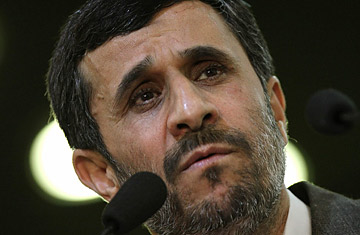
Iranian President Mahmoud Ahmadinejad
President Barack Obama's year of outreach to Iran has succeeded in putting it on the diplomatic defensive: that much was clear from Friday's blunt reproach of Tehran by the International Atomic Energy Agency's board. But it's less clear that Obama can convert that diplomatic advantage into sanctions that will curtail Iran's nuclear program. "The question is," says one senior Democratic aide in Congress, "Can Obama pivot [from engagement to sanctions] and succeed in changing conditions on the ground?" Iran is betting he can't. On Sunday, two days after the IAEA rebuke, Tehran approved plans to build 10 new enrichment plants, ordering that work begin immediately on the first five.
The Administration insists it is still open to talks with Tehran, but behind the scenes it is stepping up its efforts to approve new sanctions at the United Nations Security Council. It is also encouraging even tougher measures among like-minded allies — the European Union may adopt new penalties in mid-December. And the U.S. Congress is moving closer to passing new sanctions legislation. "We hope Iran will see the IAEA vote as disturbing" and will change course, a senior Administration official says. But for now, he adds, "We are now working to see what sanctions might be put in place."
Despite Russian and Chinese support for censuring Iran at the IAEA, they're not expected to back explicit, broad sanctions targeting elements of the Iranian economic or defense establishments beyond those directly involved in the nuclear program. The Administration's effort at the U.N. is focused on getting language included in a resolution that will give cover to countries willing to take sanctions further by targeting the Iranian power structure to raise the cost of its continued defiance.
The most promising target for expanded sanctions is the Iranian Revolutionary Guard Corps (IRGC), which not only controls much of the military and the nuclear program, but has also steadily expanded its control over other areas of Iranian political and economic life in recent years. Though Obama had criticized Secretary of State Hillary Clinton for supporting sanctions against the IRGC when both were running for the Democratic presidential nomination in 2008, the body's key role in Iran's recent election fiasco has made it a ripe target in the U.S. and abroad. The Administration is hoping that a Security Council resolution will include language that would allow countries hesitant to act without U.N. authorization to target the IRGC — and all the businesses it now controls — for tough economic sanctions.
An IRGC-targeted sanctions resolution at the U.N. is unlikely before the end of the year and could face Russian or Chinese opposition, but the European Union may move sooner. E.U. heads of state are meeting Dec. 10, and France's Nicolas Sarkozy is pushing hard for a political commitment to toughen the organization's sanctions against Iran. The U.K. has been a strong supporter of further sanctions; Germany has been unwilling to move without full E.U. support.
In Washington, both chambers of the U.S. Congress are preparing to pass widely supported bills that would punish corporations anywhere in the world that supply Iran with refined petroleum. One or both of the bills could pass before the end of the year, and they are sufficiently tough to raise concern in the Administration that they could close off all chances for diplomacy. "The problem with congressional measures is you can't turn them on and off as you like," says the senior Administration official. "We've been having ongoing discussions with the Hill," to tailor the bills and slow them up, the official says.
Considering the position the current Administration inherited last January — with the U.S. largely discredited in the region and Iran ascendant — President Obama can claim success in having turned the diplomatic tide against Iran to the point that it is increasingly likely to face some new penalties. The questions that no one can answer, however, are whether President Obama has mustered the diplomatic capital — and the political will — to put tough new sanctions in place, and whether any such measures would slow Iran's pursuit of nuclear capabilities.
